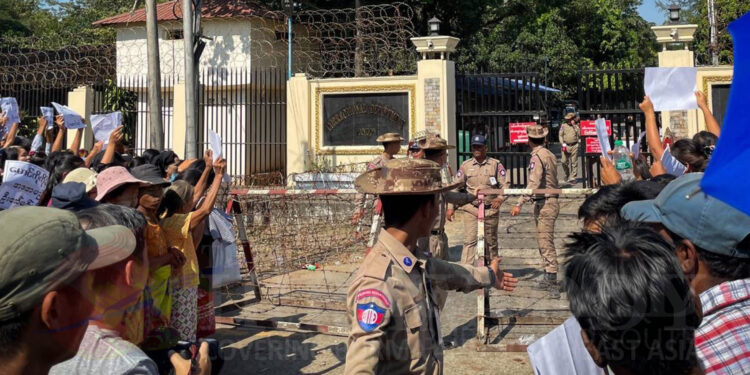One is always glad for every political prisoner released from the junta’s prisons. Glad for the elderly and the sick, who deserve to be with those who care for and respect them. Glad for the young, who should be loving, exploring, learning, growing, and playing—not wasting away in solitary cells for their sense of justice and their desire to live a life of choice. Glad for those in their middle years, who should be working to provide for their families, caring for their children and elders, and serving as the pillars of their communities and society.
At the same time, one must despise—not praise—the junta’s cynical manipulation and its notorious habit of using human lives as pawns in its political games. Once again, as it has done many times before, the junta is releasing a few political prisoners while keeping over 20,000 innocent civilians incarcerated. This ploy serves only to create a false narrative for those eager to sanitize Myanmar’s military dictatorship—a regime drenched in blood and crimes—and present it as something remotely “acceptable.”
It is no disgrace for the junta to do this; such acts are expected of brutal criminals and kleptocrats in uniforms. The real disgrace lies with the crowd that will seize upon this illusory performance of “releasing prisoners” to spread manipulative narratives like: “The State Administration Council [SAC—the junta] is showing signs of readiness to deescalate and moderate”; or “This is a positive development following the December meeting in Thailand, where Myanmar’s neighbors and Association of Southeast Asian Nations members met with junta representatives. We must build on this momentum”; or “We should give the SAC the benefit of the doubt and we should build upon its willingness to participate in peace talks and stage elections.”
All of this is pure crap—lies, fabrications and manipulation.
The junta has suffered significant defeats at the hands of determined, increasingly organized and gradually better-equipped liberation forces. By the end of 2024, it had lost control of over 60 percent of Myanmar’s territory. The SAC needs a pause to recover, reconsolidate, resupply and recruit. Min Aung Hlaing and his regime are fighting to survive on what remains of their controlled territory, but they still dream of striking back the moment their strength is restored. Their mindset of “crushing all enemies” and achieving “final victory” remains unchanged.
Who will be the voices spinning the narrative of “positive developments” and “opportunities”? There will be three main groups:
The first comprises Myanmar’s neighbors. These countries have longstanding vested interests in maintaining ties with Myanmar’s military and its oligarchic structures. Alarmed by the possibility of the SAC’s collapse, they are trying to salvage a dictatorship that has allowed them to exploit Myanmar’s natural resources and economic assets. Their plan is to try to repackage the junta cosmetically, presenting it as “reasonable and acceptable.”
The second group consists of the self-interested peace lobby. This includes peace donors and implementers. For a long time, Myanmar has been a lucrative and pleasant neocolonial place for their well-funded forums, mediations, consultancies, facilitations, trainings and study trips. After the coup, they lost relevance, opportunities to spend donor money, and partners willing to engage in this charade. The creation of a false prospect of a ceasefire and negotiations would make them busy, “relevant” and well-funded once again.
The third group are “political parties” that have been sanctioned and registered by the junta because they have shown a willingness to be co-opted and corrupted into the junta’s plans to stage fraudulent elections in limited territories, with fabricated votes and manufactured results ensuring victory for the military’s proxy party. Many of these so-called “parties” are little more than one ambitious individual, a few loyal associates, and a small circle of clients. Their reward? A token seat in parliament or, for a few, hopes of a minor ministerial post.
These groups will now clamor about “positive developments” and an “opportunity that must not be missed.”
Revolutionary forces must stay calm. They should embrace and support their released comrades, helping them heal from the trauma and harm inflicted by the junta’s prisons. At the same time, they must call out this “amnesty” for what it is: cynical manipulation and fraud.
They must tell Myanmar’s neighbors and international actors that they are once again wrong in their analysis and misguided in their persistent backing of the military. They must assert that the people of Myanmar have the sovereign right to determine their own government and that peace and stability can only come with the removal of the military dictatorship and the establishment of a genuine federal democratic system.
Revolutionary forces should ignore the peace lobby and junta-aligned “parties,” leaving them in their irrelevance.
Instead, they must stay focused on their joint struggle. The people of Myanmar, united with their ethnic revolutionary organizations (EROs) and People’s Defense Forces, have already liberated over half the country. For the people of Myanmar and all its ethnic groups, in order to be free and at peace, it is inevitable that hard battles for the center need to be waged and won.
This is the monumental task of 2025. Success will require strong political and military cooperation between the NUG and EROs. My Pascalian bet is that the alliance will hold, the struggle will continue, the momentum sparked by Operation 1027 will be sustained, and victory will be achieved, leading to the removal of Min Aung Hlaing and the SAC.
When that day comes, and the military accepts that it can no longer dominate Myanmar’s politics and economy, peace and security will be restored. National political dialogue will become possible, compromises can be forged, the economy will recover, and genuine elections can take place.
Igor Blazevic is a senior adviser at the Prague Civil Society Centre. Between 2011 and 2016, he worked in Myanmar as the head lecturer of the Educational Initiatives Program.

















